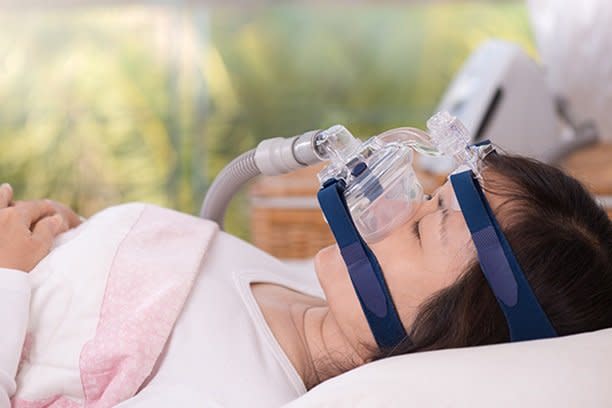Study links apnea issues to memory, thinking problems

NEW YORK, March 3 (UPI) -- Sufferers of sleep apnea may be more likely to experience memory or thinking problems, a new preliminary study suggests.
The research, based on a nationally representative sample of U.S. adults, was released Sunday and will be presented at the 76th annual meeting of the American Academy of Neurology in Denver that begins April 13.
While the study found that participants with sleep apnea symptoms had higher odds of memory or thinking problems, it did not determine whether the disorder causes cognitive decline.
This common condition causes repeated breathing interruptions during sleep, potentially lowering blood oxygen levels. Symptoms include snorting, gasping and breathing pauses. People with sleep apnea also have morning headaches or difficulty staying on task.
The new study included 4,257 individuals from age 20 to older than 80. They replied to a questionnaire inquiring about sleep quality, as well as memory and thinking problems.

Those who reported snorting, gasping or breathing pauses during sleep were classified as having sleep apnea symptoms. Those who reported difficulty remembering, periods of confusion, trouble concentrating or decision-making problems were classified as experiencing memory or cognitive symptoms.
A total of 1,079 participants reported symptoms of sleep apnea. Of those with symptoms, 357 people, or 33%, said they had memory or thinking problems compared to 628 people, or 20%, without sleep apnea symptoms.
The survey revealed that people who reported sleep apnea symptoms were about 50% more likely to also report experiencing memory or thinking problems compared to people without these symptoms.
Researchers adjusted for other variables that could play a role in memory and thinking problems -- including, race, gender and education.
Proactive measures
"Given the prevalent underdiagnosis and undertreatment of sleep apnea, proactive measures in screening and managing sleep apnea are needed," Dr. Dominique Low, the study's author and a neuromuscular fellow in the department of neurology at Boston Medical Center, wrote in an abstract to be presented at the meeting.
Low told UPI that effective treatments such as continuous positive airway pressure, or CPAP, machines are readily available to help.
"Quality sleep -- along with eating a healthy diet, regular exercise, social engagement and cognitive stimulation -- may ultimately reduce a person's risk of thinking and memory problems, improving their quality of life," she said.
This research is among other large-scale studies to examine the relationship between brain health and disrupted sleep, said Dr. Sudha Tallavajhula, medical director of the TIRR Memorial Hermann Neurological Sleep Medicine Center in Houston. She was not involved in the study.
"Sleep apnea is associated with a high risk of developing cognitive impairment. Previous studies have suggested that the brain develops cumulative neuronal damage over years of suffering from this disorder," Tallavajhula said, noting the importance of treating sleep apnea "as a potentially reversible factor underlying cognitive decline."
Toxins eliminated
As the brain stays active during the day, it produces toxins, such as amyloid, which are eliminated during efficient sleep, said Dr. Anna Burke, medical director of the Alzheimer's & Memory Disorders Program at Barrow Neurological Institute in Phoenix.
When sleep apnea impedes this clearance process, it can damage the brain. This leads "to a 'chicken or the egg' question of whether impaired sleep, particularly in midlife, leads to cognitive impairment or if it's one of the first warning signs of cognitive impairment," Burke said.
She added that "if you want to improve your chance of maintaining your cognitive health as you age, prioritize sleep and address conditions such as sleep apnea that can affect it."
About 5 to 15% of the U.S. population and perhaps as many as 1 billion people worldwide have sleep apnea, said Dr. Jonathan Marcus, an associate professor of clinical neurology and division chief of sleep medicine at the University of Rochester Medical Center in Rochester, N.Y.
In addition to potential cognitive impairment, people with sleep apnea "often experience significant daytime sleepiness and have significantly increased risk for cardiovascular disease like heart attacks and strokes," Marcus said.
Many patients with sleep apnea have trouble with attention, concentration and memory, said Dr. Katherine Sharkey, an associate professor of medicine and psychiatry and human behavior at the Warren Alpert Medical School of Brown University in Providence, R.I.,
Scary experience
"In my experience, memory difficulties can be very scary for patients -- they worry it is a sign of Alzheimer's disease or some other irreversible dementia," said Sharkey, a sleep medicine physician. "Interestingly, these cognitive issues are often the symptoms that improve the most when we treat sleep disordered-breathing."
She said she would recommend that people not attribute concentration or memory problems solely to aging. They also shouldn't ignore these symptoms or be afraid to pursue a medical evaluation.
People with sleep apnea symptoms should ask their doctor if it's worth having a sleep study, said S. Justin Thomas, director of the University of Alabama at Birmingham's Behavioral Sleep Medicine Clinic.
"If you have difficulties thinking or remembering things, speaking with your physician about your sleep may help identify a potential contributor," Thomas said.
Adults typically need seven to eight hours of quality sleep every night. "Conditions like sleep apnea can compromise quality sleep and should be treated," said Dr. David Shaha, sleep lab and sleep fellowship director at the University of Iowa Health Care in Iowa City.
CPAP remains the gold-standard treatment for sleep apnea. Yet, there are many misconceptions among clinicians and patients, said Tallavajhula, who is also an associate professor in the department of neurology at the University of Texas Health Science Center at Houston (UTHealth Houston) Medical School.
"Very often, once the initial discomfort is addressed, most patients tolerate CPAP seamlessly long term," she said. "It is one of the few medical interventions with high efficacy and minimal adverse effects."

